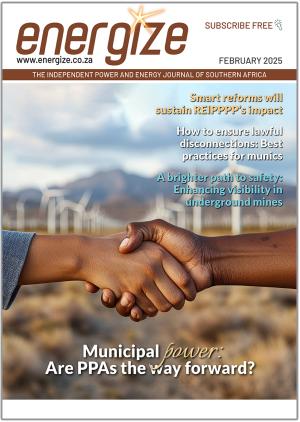South Africa could slash nuclear power plant capital costs by 30% if ageing coal-fired power stations were converted into nuclear facilities – a move that would save trillions of rands in establishing new grid infrastructure.
This is according to Zizamele Mbambo, Deputy Director-General: Nuclear Energy and Regulation Management at the Department of Mineral Resources and Energy, speaking during the Presidential Climate Commission’s “Energy Dialogue on the Role of Nuclear in South Africa’s Energy Mix” event.
Despite its long-standing expertise in nuclear energy, South Africa lags behind other countries in capitalising on nuclear as a sustainable power solution. “Nuclear contributes only a small portion to the national energy mix. We want to participate in the full value chain of the nuclear fuel cycle from mining, conversion and enrichment to fuel fabrication, power generation and management,” said Mbambo.
Nuclear power’s high upfront capital costs decline significantly after the first 20 years of operation. “This is evident at Koeberg, which has become one of the most cost-effective power sources,” he said. Koeberg produces the cheapest electricity on South Africa’s grid with operating costs of just 15 cents per kilowatt-hour, he added.
Modern nuclear plants also offer flexibility to adjust power output based on demand, making them a reliable complement to renewables. “Small modular reactors offer flexible, cost-effective deployment opportunities. These range from micro reactors of 120 MW to large-scale units exceeding 1 000 MW suitable for various applications across different regions,” Mbambo said.
Nuclear power plants with lifespans of 60 years, extendable by another 20 years, could provide jobs for up to 100 years considering the construction, operation and decommissioning phases, he added.
Beyond electricity, nuclear technology can play a role in clean hydrogen production, offering a cost-effective method to support South Africa’s decarbonisation efforts, said Mbambo.
“At its peak in the early 2030s, global nuclear capacity additions will reach 30 GW per year – five times the rate of the past decade. South Africa should consider joining international initiatives to support the role of nuclear energy in achieving net zero by 2050. Nuclear energy should also be considered for inclusion in the green taxonomy to enable investment in nuclear projects,” Mbambo said.
At the 28th Conference of the Parties (COP28) to the United Nations Framework Convention on Climate Change, 25 countries pledged to triple their nuclear power capacity by 2050. At COP29, this increased to 31 countries with 14 of the world’s largest financial institutions endorsing the declaration to triple nuclear power, Mbambo said.















